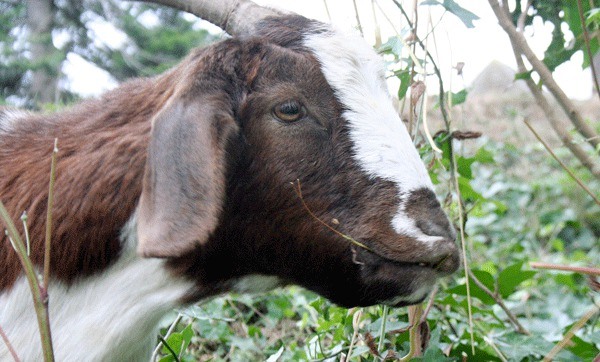What people see as an invasive weed, goats see as a tasty snack.
A herd of more than 40 goats, along with a guard llama, enjoyed a giant smorgasbord of ivy and blackberry bushes that are overgrowing parts of Coupeville’s Town Park located near historic downtown.
The goats are spending five days in Coupeville munching on the plants that threaten the trees and native plants at the park. Town officials hope their new four-legged friends will do a better job controlling ivy and blackberry growth than recent volunteer efforts have been able to accomplish.
Forty-three Bauer Cashmere goats arrived from a La Conner-based farm Thursday afternoon and, once the small fence was erected, started chomping on every ivy branch and berry bush they could find.
“Blackberries are truly one of their favorite things,” said Carol Osterman of Akyla Farms, who brought the weed managing goats to Coupeville.
They will spend five days eating unwanted plants at Town Park. The popular park is home to the pavilion which hosts Concerts on the Cove. It is also the location of the town’s popular veterans’ remembrance ceremony that takes place every Memorial Day.
The town of Coupeville is spending $200 a day for the goats. Coupeville Mayor Nancy Conard said the price could be worthwhile if the goats consume most of the ivy at the park.
“The primary thing is to remove the ivy,” Conard said adding its an invasive plant that threatens trees if the the vines reach the canopies and disrupt photosynthesis. Osterman said the ivy can also weigh down a tree and cause it to topple. Ivy’s shallow roots can also cause erosion.
Coupeville Town Council member Ann Dannhauer discovered the goat herd through an Internet search. She had been searching for a potential goat herd to tackle the town’s ivy problem and found Osterman’s herd was one of the closest to Whidbey Island.
Dannhauer has volunteered in the past on work crews to unroot the unwanted ivy. One attempt resulted in a group of five volunteers spending several hours in Town Park.
“It’s pretty exhausting,” Dannhauer said of the weed pulling, adding that volunteers may have to return after the goats finish to remove the roots.
In the meantime, the goats are busy consuming the park’s ivy problem. Osterman said that the goats don’t really like traveling, but tolerate it because they know there will be food when they get out of the trailer.
Despite being herded in an area of the park not easily visible from the roadway, the goats quickly drew the attention of passersby, who stopped by to see them in action. They weren’t able to get too close, however. A short electrified fence powered by a battery and a solar panel saw to that.
The electrified fence would give a person a shock, Osterman said. But the fence really serves two purposes. The fence will keep the goats in, but it would also keep domesticated dogs out. She has had problems in the past with domesticated dogs attacking her goats.
In addition to the electric fence, she also has a llama, named Fiber, to protect her goats. She said Fiber could easily leap over the short fence, but the llama has bonded with the herd and wants to be with them.
Osterman has been using goats for vegetation management for about five years. The Town Park project is the first time the goats have been used for a public project. She has brought her goats to Whidbey Island before; the goats have been used north of Oak Harbor and near Clinton in past projects, Osterman said.
Akyla Farms offers her goats to private property owners for vegetation management too. For more information go to www.akylafarms.com or call 360-466-2058.



